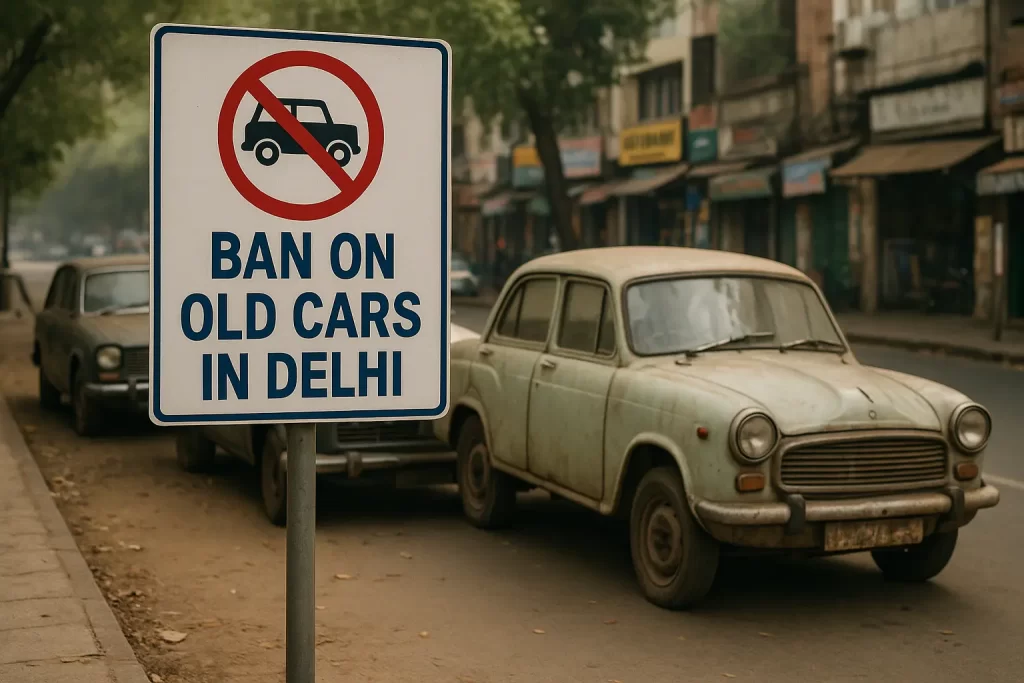What if the capital city woke up without the sound of a single car engine? Recently, a new policy announced by Delhi clarifies that it will ban the majority of cars from entering the city starting November 1, 2025, in a major shift meant to reduce toxic air pollution.
This is an important move towards sustainable urban living as only BS-VI compliant, CNG, or electric commercial vehicles will be permitted. Additionally, petrol stations will no longer service diesel vehicles older than ten and petrol vehicles older than fifteen.
To get the complete details regarding this subject, make sure you stick to this article until the end.
The Rationale Behind the Ban
Delhi, which frequently ranks among the most polluted cities in the world, has long struggled with serious air quality problems. A large amount of the city’s dust levels are caused by vehicle emissions, which greatly worsen this issue. The government has implemented strict measures to reduce pollution and encourage sustainable transport because it recognizes the urgent need for prevention.
Key Provisions of the New Policy Announced
1. Ban on Older Vehicles: Beginning April 1, 2025, it will be illegal for petrol-powered cars older than 15 years and diesel-powered vehicles older than 10 years to refuel at Delhi’s gas stations. Automatic Number Plate Recognition (ANPR) cameras placed at more than 500 petrol stations throughout the city will be used to enforce this policy.
2. Restrictions on New Registrations: Three-wheelers that run on fossil fuels will not be allowed to be registered as of August 2025. Furthermore, no new two-wheelers powered by petrol, diesel, or CNG will be registered in Delhi after August 2025.
3. Mandating Electric Vehicles for Multiple Car Owners: The new rule requires households purchasing a third car to make sure it’s an electric vehicle. The goal of this mandate is to encourage private vehicle owners to switch to electric vehicles more quickly.
4. Transition of Public Transport: The government intends to replace 90% of CNG public buses with electric vehicles by December 2025. Public transport emissions should be greatly reduced as a result of this change.
Infrastructure Development
The Delhi government is making investments in strong infrastructure development to encourage the broad use of electric vehicles:
- Charging Stations: More than 13,200 EV charging stations are planned to be installed throughout the city, with a facility every five kilometres.
- Battery Swapping Facilities: To help EV users who are concerned about their range, the policy includes provisions for battery swapping stations.
- Incentives: Incentives and subsidies are being provided to promote the purchase of electric cars and the installation of electric kits in already-owned vehicles.
Enforcement and Compliance

The success of this policy hinges on effective enforcement:
- Technology Integration: ANPR cameras at fuel stations will automatically detect non-compliant vehicles, preventing them from refueling.
- Penalties: Owners of vehicles violating the ban may face fines up to ₹10,000, and their vehicles could be impounded.
- Public Awareness: The government is launching awareness campaigns to educate citizens about the new regulations and the benefits of transitioning to electric vehicles.
Challenges and Considerations
While the policy is ambitious, it presents certain challenges:
- Economic Impact: The ban may disproportionately affect lower-income groups who rely on older vehicles for their livelihood.
- Infrastructure Readiness: The rapid development of charging infrastructure is crucial to meet the anticipated demand for electric vehicles.
- Interstate Coordination: Ensuring compliance from vehicles entering Delhi from neighboring states requires coordinated efforts.
Conclusion
Delhi’s 2025 policy marks a significant step towards sustainable urban mobility and improved air quality. By phasing out ICE vehicles and promoting electric alternatives, the city aims to set a precedent for other urban centers grappling with pollution. The successful implementation of this policy will depend on robust infrastructure, effective enforcement, and public cooperation.
FAQ
1. What is the new car ban policy in Delhi 2025?
A. The Delhi government has announced a policy to phase out internal combustion engine vehicles, starting with a ban on petrol cars over 15 years old and diesel cars over 10 years from April 2025.
2. Will I still be able to drive my old car in Delhi?
A. No. If your petrol vehicle is over 15 years old or your diesel vehicle is over 10 years old, it will not be allowed to refuel or operate legally within city limits.
3. What are the penalties for violating this policy?
A. Violators may face fines up to ₹10,000, and their vehicles could be impounded.
4. Are electric vehicles exempt from the ban?
A. Yes, electric vehicles (EVs) are encouraged and fully exempt from restrictions.
5. How is this being enforced?
A. ANPR cameras at over 500 fuel stations will track vehicle compliance using number plate recognition.







